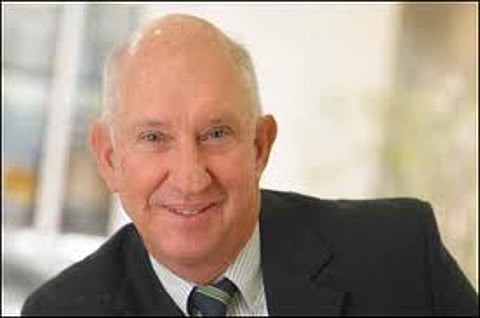Surfer chairman of WBHO: construction has cleaned up its act, ready to build
WBHO chairman Mike Wylie is not your average corporate executive. He has been with the company 38 years, lives modestly and eschews Plett and Cape Town to holiday annually in lower profile St Francis Bay. Even at 62, he prefers surfing to wining and dining; and his idea of an ideal night out is a movie with wife Wendy. Wylie loves building things and believes his firm does it damn well. But right now he's in the crosshairs of an angry nation.
Last week Wylie ignored the advice of pretty much all of the "experts" by agreeing to join me yesterday on CNBC Africa's Power Lunch. There was no last minute cancellation, either, even though he had a good excuse. Just hours before airtime, his daughter-in-law went into labour with the construction man's first grandchild. The baby, a boy, was born a couple hours after he left the studio.
You can watch the full television interview and read the transcript by clicking here.
Wylie, a civil engineer who also holds an honours degree in commerce, was determined to provide perspective. His industry has taken a hammering lately. He knew it was coming. The last three years he's been pre-occupied by the Competition Commission's case against the construction sector, sifting through thousands of tender documents to discover how and where his beloved WBHO slipped up. He tells me he's appalled that there were 21 bids by his firm that broke competition law. That's 21 out of around 5 000 in the last ten years. But, he admits, 21 too many.
Our interview lived up to expectations. Wylie was his usual passionate self. Keeping his counsel on the media's shrill street posters about "crooked" builders and "long running" cartels. But unable to resist telling us what a great industry he works in. Viewers may have concluded Wylie's PR people trained him to say that. Not so. In reality, he really believes it.
Narrative can be presented any way its communicator desires. In the hands of the numerate, though, the figures never lie. If collusion is endemic in SA's construction industry, as some scribblers would have us believe, then Wylie and his like are really bad at it. Last Thursday, Stats SA released its latest report on industry profit margins. Construction, at 2,1%, has the lowest profit margin of the 9 industries surveyed.
Then there are the global comparisons. Wylie used them to make his point. The starkest of these is Durban's King Shaka Airport, which compares in scale and complexity with Heathrow's Terminal Five. Wylie's firm helped to build the new pride of KZN which, he says, cost the country one eighth of its UK equivalent – £500m versus £4bn.
Another riposte was to addressing hysteria around the cost of the 2010 FIFA World Cup stadiums. Wylie explained that London's Wembley cost R10bn and virtually bankrupted the builder who did the work. For the same amount of money, South Africa got three Wembley-like arenas – Soccer City (Jhb), Moses Mabhida (Dbn) and Greenpoint (CT).
Wylie added that it costs WBHO's Australian subsidiary between two and three times as much to build an identical building there than it does in SA. Reason? South Africans have the advantage of lower labour and material costs. But, he claims, also work harder, more efficiently and draw on a strong education network that produces quality construction professionals.
If the message coming out of the interview was that the construction industry is pure as driven snow, then something got lost in translation. It's a fact there were abuses like collusion on bids; cover pricing and other disgusting practices. All of which hark back to the Apartheid Era where SA's Siege Economy demanded products no matter how they arrived. A blind eye was turned to collusive practices. Sometimes companies were even encouraged to work together. Not that long ago, cement industry executives happily argued with me on public radio how their cartel was in the national interest because it ensured consistent supply.
On reflection, there are two key conclusions to be drawn from the Competition Commission's investigation.
First, it was a brilliance strategy by the Competitions Authorities to get construction companies to "tell" on each other. By offering leniency to the first firm that admitted a tender abuse, they forced the companies to do all the work. That ensured every dodgy tender was exposed – and after eliminating double counting that came to 55 out of an estimated 20 000 in the period. A cancer that required excising. But hardly endemic.
As important a result is that the country can now pull the trigger on its strategy of following an infrastructure-driven Chinese growth model. While collusion charges still hung over the industry, Government was right to take its time over kicking the promised R4-trillion programme into gear. It should now be confident the industry has cleaned upped its game. Which means the massive investment in turning the country into a construction site is much more likely to deliver value for our tax money.
"This will never happen again," the WBHO chairman said, "and hasn't been happening for some years. I had to go through 2 000 bid tenders to find the first one that was a problem." That's comfort. But more so is how the public's outrage has cut into the reputations of companies like his. Over the past three years, processes have been installed at every major construction firm to double-check every bid. That's what makes Wylie confident collusion will not recur. So let the grand investment begin. The economy desperately needs the kick-start its long promised infrastructure programme will bring.

